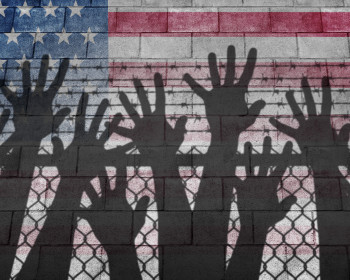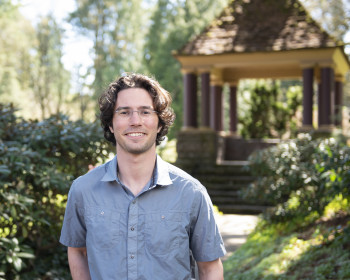Students receive national recognition for academic excellence
Open gallery
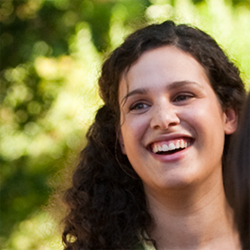
This spring, awards and honors are streaming in from prestigious national organizations like the Fulbright Program and the Barry M. Goldwater Foundation. Learn more about the student and alumni recipients and how they hope to impact the world in the stories below.
Jump to:
- Barry M. Goldwater scholarships
- Fulbright grants
- William Jefferson Clinton Scholar and Oregon Consular Corps scholarship recipient
- National Science Foundation Graduate Research Fellowships
- 100 Projects for Peace award
Two students earn national science honors
Irena Bierzynski ’11 and Alex Simon ’11 received Barry M. Goldwater scholarships, widely considered the preeminent award in the United States for undergraduates preparing for careers in the sciences.
Demonstrating growing recognition of Lewis & Clark’s leadership in the sciences, ten Lewis & Clark students have received Goldwater scholarships in just the past five years.
This year, 278 Goldwater Scholars were selected on the basis of academic merit from a field of 1,111 mathematics, science, and engineering students who were nominated by the faculties of colleges and universities nationwide.
The Goldwater scholarships awarded to Simon, a biochemistry and molecular biology major, and Bierzynski, a chemistry major, will support their work throughout the 2010-2011 academic year.
Learn more about this year’s recipients below.
-
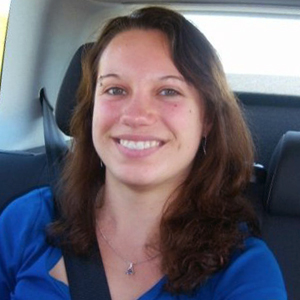 Irena Bierzynski ’11, a chemistry major, earned a Goldwater Scholarship to support her investigation of pericyclic and pseudopericyclic reactions.
Irena Bierzynski ’11, a chemistry major, earned a Goldwater Scholarship to support her investigation of pericyclic and pseudopericyclic reactions. -
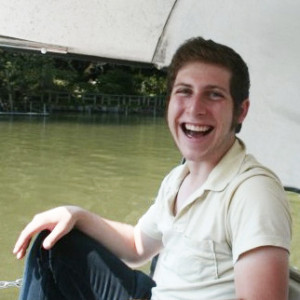 Alex Simon ’11, a biochemistry and molecular biology major, earned a Goldwater Scholarship to support his research in neuroscience.
Alex Simon ’11, a biochemistry and molecular biology major, earned a Goldwater Scholarship to support his research in neuroscience.
Irena Bierzynski ’11
Hometown: Detroit, Michigan | Major: chemistry
What drew you to studying the sciences?
I have always found the sciences to be the most engaging area of academic study, especially chemistry. It’s fascinating because the structural properties of molecules can be related to the observable properties of the materials they make up. We as researchers can take what we find in all areas of the sciences and turn it to so many amazing uses.
What question are you trying to answer with your research?
I am researching reaction mechanisms via computational chemistry. In particular, I have been investigating pericyclic and pseudopericyclic reactions. I use high-level computational methods to determine the path through which certain disputed reactions proceed.
The research done by my group has interested other researchers in our field and caused them to bring us different projects. Colleagues have seen our work and suggested other questions that it could be used to answer.
How do you think faculty-student collaboration has influenced you?
I work very closely with faculty, especially my advisor, Jim Duncan. During my time studying and researching at LC, I have had the opportunity to become close with all my professors. This closeness, of course, makes the learning and working environment much more productive. It has also contributed to me finding the confidence, opportunities, and resources to develop my research on my own. I have gained experience not only in assisting in research, but in designing and presenting my own research.
What are your plans for the future, and how do you think your Lewis & Clark education is preparing you for those goals?
My plans for the future are quite uncertain. I’d like to work in the chemical industry and go on to graduate school, but I’m still exploring the many areas of chemistry and am not sure where I’ll specialize. My education at Lewis & Clark has allowed me to gain the research experience I’ll need to be competitive in my job search and graduate school application process. Lewis & Clark has also shown me options for my future, through visiting speakers from graduate programs and making it possible for me to attend the American Chemical Society meeting this spring.
Alex Simon ’11
Hometown: Louisville, Kentucky | Major: biochemistry and molecular biology
What drew you to studying the sciences?
I love the sciences, and particularly biochemistry. Studying in this field really gives you insight into the sheer complexity of how our body operates. We are engineered with a greater intricacy and attention to detail than any machine. The hunt to elucidate how we function on a molecular level is what fuels my desire to perform research.
What question are you trying to answer with your research?
In my research, I am investigating the molecular basis of long-term memory formation in the hippocampus. Research in this field has demonstrated a vast potential to provide profound tangible benefits to humankind. Many neurological diseases involve a component of memory dysfunction. If we can create a molecular model for how long-term memories are formed, this knowledge would no doubt change the landscape of psychopharmacology.
How do you think faculty-student collaboration has influenced you?
I work very closely with my advisor, Professor Janis Lochner. She’s been an excellent research mentor to me since I began working in her lab. Professor Lochner provides me with crucial support and guidance while encouraging and assisting with my own personal research goals. I think it’s safe to say that my experiences in her lab have solidified my decision to pursue a PhD in neuroscience.
What are your plans for the future, and how do you think your Lewis & Clark education is preparing you for those goals?
I plan to earn a PhD in neuroscience. I feel like if I had not enrolled in Lewis & Clark, that response would have been quite different. At Lewis & Clark, I am able to foster personal relationships with my professors and also have the ability to carry out research with them. At a larger state school, I don’t think that these opportunities would have ever existed. Thanks to LC, I am currently not only interested in graduate school, but qualified as well.
Fulbright Program honors Lewis & Clark students
Seven Lewis & Clark seniors and four recent alumni will spend the next year teaching and researching on three different continents after receiving prestigious awards from the Fulbright Program.
Established in 1946, the Fulbright Program fosters mutual understanding among nations through educational and cultural exchanges. In the past five years, nearly 20 Lewis & Clark students have received Fulbright awards, demonstrating a sustained commitment to international education and engagement.
The following students and recent alumni received Fulbright awards for the 2010-11 academic year: Emily Dowd ’10 (teaching assistant, Germany), Jayson Estassi ’10 (teaching assistant, Spain), Matthew Hambro ’10 (teaching assistant, Austria), Jessica Houston ’10 (teaching assistant, Russia), Stephanie Locke ’10 (teaching assistant, Slovakia), Megan Mills-Novoa ’09 (research grant, Chile), Maria Morrison ’10 (teaching assistant, Taiwan), Peter Seilheimer ’09 (teaching assistant, Austria, for a second year), Elisabeth Ullman ’09 (teaching assistant, Austria), Clara Williams ’09 (teaching assistant, Austria), and Jehan Yahya ’10 (teaching assistant, Spain). This marks the largest number of Lewis & Clark students and alumni earning Fulbright honors in a single year.
Learn more about some of this year’s recipients below.
-
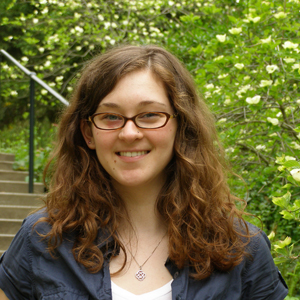 Emily Dowd ’10 received a teaching assistantship (Germany)
Emily Dowd ’10 received a teaching assistantship (Germany) -
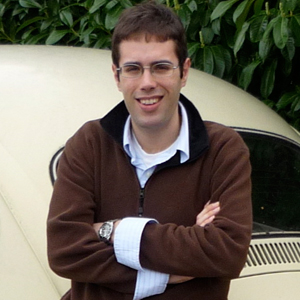 Jayson Estassi ’10 received a teaching assistanship (Spain)
Jayson Estassi ’10 received a teaching assistanship (Spain) -
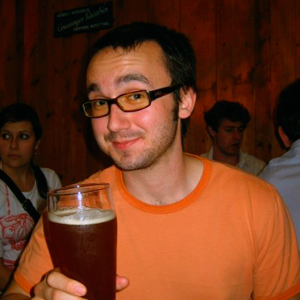 Matthew Hambro ’10 received a teaching assistantship (Austria)
Matthew Hambro ’10 received a teaching assistantship (Austria) -
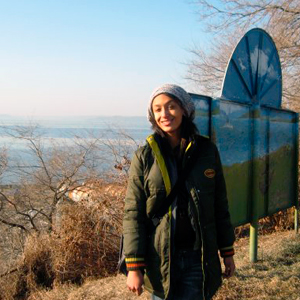 Jessica Houston ’10 received a teaching assistantship (Russia)
Jessica Houston ’10 received a teaching assistantship (Russia) -
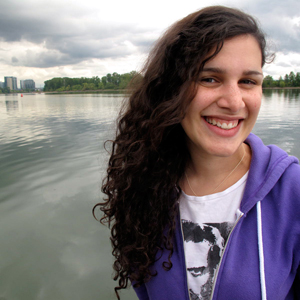 Stephanie Locke ’10 received a teaching assistantship (Slovakia)
Stephanie Locke ’10 received a teaching assistantship (Slovakia) -
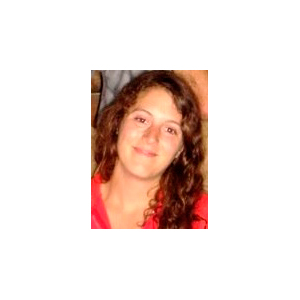 Megan Mills-Novoa ’09 received a research grant (Chile)
Megan Mills-Novoa ’09 received a research grant (Chile) -
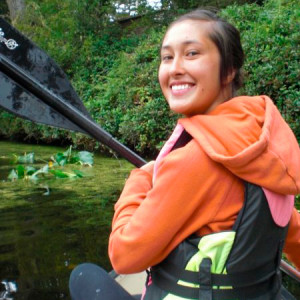 Maria Morrisson ’10 received a teaching assistantship (Taiwan)
Maria Morrisson ’10 received a teaching assistantship (Taiwan) -
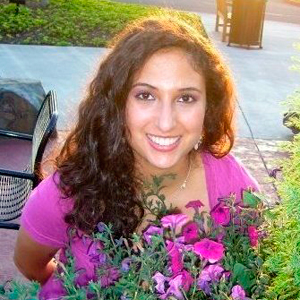 Jehan Yahya ’10 received a teaching assistantship (Spain)
Jehan Yahya ’10 received a teaching assistantship (Spain)
Emily Dowd ’10
Hometown: Redwood City, California | Majors: German studies and history
Award: English Teaching Assistantship in Mainz, Germany, where she will likely work as a language and cultural studies assistant.
What drew you to studying German and what excites you about the idea of teaching in Germany?
I took four years of German in high school to fulfill the language requirement of the International Baccalaureate Program and continued at Lewis & Clark because it was a familiar thing I felt I needed my first semester.
I honestly didn’t initially plan on being a German Studies major (or a double major at all), but I’m very glad that changed. I grew to love German culture after so many years of studying the language and the literature and especially after living in Munich for a year. I’m excited to be able to go back. It’ll be like visiting an old friend, and I hope I’ll be able to make more of the kinds of transatlantic connections and friendships I made the first time.
How do you think your Lewis & Clark education has contributed to you seeing yourself as a citizen in a global community?
One of the very first things I liked about Lewis & Clark was the scope of the study abroad programs, not just the comparatively large amount of students who study abroad, but the range of possible locations. I’ve had many conversations with friends who’ve been all over the world on Lewis & Clark programs and have seen how those experiences have shaped who we became, and I think almost all of us come back to the States feeling at least a little bit like honorary citizens of our host country/countries.
What are your plans for the future, and how do you think your Fulbright experience will figure in those plans?
I think afterward I’ll be able to more affirmatively say whether or not I want to be a teacher and, if so, begin pursuing that. I think teaching, especially history, would be challenging but also quite a lot of fun. I’m just not sure if I’m up to it. I’ll find out, and if the answer is no I’d hope to eventually return to Germany a third time, perhaps permanently, to work in the field of museum studies.
Jayson Estassi ’10
Hometown: Burlingame, California | Majors: history and Hispanic studies
Award: English Teaching Assistantship in Spain, where he will work at a secondary school in metropolitan Madrid.
What drew you to studying Spanish and what excites you about the idea of teaching in Spain?
Spanish, in one form or another, has always surrounded me. My mother was born and raised in rural Paraguay and then lived in Argentina before coming to the United States. I still have over a dozen aunts and uncles, in addition to numerous cousins, scattered across South America. Despite this, I never spoke Spanish growing up—English was the only language my parents had in common—so, like many others, I began learning Spanish in middle school. It’s been a long journey since then, and I hadn’t been planning on majoring in Hispanic Studies until I started taking classes in the department here at Lewis & Clark and realized the quality of the faculty and curriculum.
So, why Spain? Well, that’s a long story, but basically the country cast a spell on me the first time I visited. If I had to pin it down, I would say that I am drawn there because Spain is like Latin America, but it’s not; it’s like Lebanon, where my dad is from, but it’s not.
Add to that the fact that I’ve wanted to be a teacher since I was a little boy, and I knew I had to apply to the Fulbright ETA program in Spain.
How do you think your Lewis & Clark education contributed to you seeing yourself as a citizen in a global community?
The students, faculty, and staff of Lewis & Clark have a striking ability to be able to look beyond what happens in Portland, in Oregon, or even in the United States, and have a more global perspective. We are lucky that perspective is such a large part of the culture here, and it is something that initially drew me to the College.
In the classroom, my professors and classmates never let me stop questioning the way things “should” be. I treasure what I have learned from them and the relationships we’ve developed together. You can’t be here without engaging in some form of critical thinking. And if I’ve realized anything over the past four years, it’s that while other institutions talk nebulously about student leadership, at Lewis & Clark it actually happens. I am lucky to have been involved in a number of pursuits that have given me the opportunity to grow as leader and individual.
What are your plans for the future, and how do you think your Fulbright experience will figure in those plans?
Following my experience in Spain, I plan on enrolling in a master’s program in teaching. I have considered at various times teaching history, English, or ESL. Although I am not sure exactly where the future will take me, I will never forget how my teachers have inspired me over the years.
Matthew Hambro ’10
Hometown: St. Louis Park, Minnesota | Major: German studies
Award: English Teaching Assistantship in Austria, where he will teach at a high school and technical school in the town of Wiener Neustadt (New Vienna)
What drew you to studying a foreign language and what excites you about the idea of teaching English in the country you have been placed?
I was drawn to foreign languages mainly by the excitement of learning about different ways of life. I’m excited to finally be able to teach language. I have some teaching experience, but it’s mostly been unrelated to my German concentration. This is a fortunate intersection of two interests of mine.
Have you participated in any study abroad trips during your time at Lewis & Clark? If so, what was that experience like?
I participated in the Munich study abroad program during the 2008/2009 school year. The experience was unrepeatable. My favorite part was visiting friends from the university in their various hometowns in Bavaria. The administrators are absolutely amazing and did so much to make us feel integrated and confident getting around the city in no time.
How do you think your Lewis & Clark education contributed to your development/growth in seeing yourself as a citizen in a global community?
My time at Lewis & Clark has shown me that there is much more to the world outside the United States than headlines in the international section of the New York Times. Talking to people first-hand paints a much livelier picture of the wide world than pictures and stories from journalists. I think everyone should experience that.
Jessica Houston ’10
Hometown: Portland, Oregon | Major: international affairs
Award: English Teaching Assistantship in Russia, where she will be teaching English in a Russian university.
Have you participated in any study abroad programs during your time at Lewis & Clark?
I studied abroad in Vladivostok, Russia for a semester my junior year because I wanted to see a part of Russia that most westerners don’t get to see. Studying with international students from Korea, Japan, and China appealed to me especially. Where else can an American meet a North Korean? I learned about the great diversity between East Asian cultures and languages and even about the diverse indigenous populations of the Far East and Siberia. I especially appreciated learning more about Russia’s relations with its neighbors and the region’s complex sense of nationality, ethnicity, and identity.
How do you think your Lewis & Clark education has contributed to you seeing yourself as a citizen in a global community?
At Lewis & Clark College I have most valued my experiences engaging with different worldviews and perspectives. I have had many opportunities to get involved with what I am learning beyond the classroom. I am most indebted to my study abroad experience for shaping my global outlook since I had never been overseas before. During the four months I spent in the Russian Far East I managed to learn more about Russian culture, language, and politics than I ever could have in a U.S. classroom.
What are your plans for the future?
I plan to pursue a career in education that promotes understanding among students from different cultures and backgrounds. Ideally, I would like to combine my interests in foreign languages, culture, and public diplomacy through a teaching career that promotes intercultural exchange.
Stephanie Locke ’10
Hometown: Newport, Oregon | Major: communication
Award: English Teaching Assistantship in Slovakia, where she will teach either high school or college students.
What drew you to studying a foreign language? What excites you about the idea of teaching English in Slovakia?
I lived in Slovakia for one year after high school as a Rotary exchange student. I loved my time there and am looking forward to returning. I want to be a teacher, so this opportunity to teach English in Slovakia is very exciting. I’m looking forward to teaching English as a way to help my students express themselves and their culture.
How do you think your Lewis & Clark education contributed to you seeing yourself as a citizen in a global community?
Almost every class I had a Lewis & Clark helped me understand myself as a global citizen. One of the first communication courses I took was Media Across Cultures with Peter Christenson, and it was really eye opening for me to see the role American media has played in various parts of world. I’m also so grateful for Professor Tatiana Osipovich, because in every Russian course I took with her we learned not only Russian language, but also about Russian culture. Her classes helped me understand more about the Slavic region that I had previously witnessed but never fully understood. The highlight of my experience at Lewis & Clark was when I got to pull everything together for my senior communication thesis. I analyzed stories of miscommunication from both Russian and American travelers. While working on my thesis I was able to explore some of the difficulties foreigners face when in a new place, and role communication plays.
What are your plans for the future, and how do you think your Fulbright experience will figure in those plans?
My plan is to return to Lewis & Clark and continue my education with a MAT in Early Childhood/Elementary Education. I am really looking forward to teaching and evidence from this experience in Slovakia will no doubt appear in my classroom when I become a teacher. I think it is very important to teach young children about the world and to embrace cultures different from their own.
Megan Mills-Novoa ’09
Hometown: Minneapolis, Minnesota | Major: environmental studies/conservation biology
Award: Research Fellowship in Chile, where she will study of the effects of climate change on wine production within the Maule and Maipo Valleys
Last year, you received an Emerson Fellowship. Can you share a bit about what that experience was like, and what you’ve been up to since graduating?
My time as an Emerson National Hunger Fellow has provided me the opportunity to engage and interact with social change, food access, and policymaking. I spent the first six months of the year in Albuquerque, N.M., working with middle school students as a youth organizer on a campaign to increase student access to the National Breakfast Program and National School Lunch Program. I am currently living in Washington D.C. and working with the National Family Farm Coalition. My work with the coalition focuses on addressing issues facing young, beginning farmers such as mentoring programs, farm credit, and land access. I spend most of my working day attending hearings on the Hill, conducting phone interviews with young farmers advocates, and working with coalition members on variety of family farm initiatives. In my time off I have been bicycling, rock climbing, and seeking out the best burrito in D.C.
Did you participate in any study abroad programs during your time at Lewis & Clark? If so, what was that experience like?
During my junior year at LC I studied in Havana, Cuba. This experience was exceptionally powerful for me because my father emigrated from Cuba in 1961. I was the first member of my extended family to go back and my time in Cuba was not only about experiencing this intensely complicated country, but also exploring my own identity as a Cuban-American.
How do you think your Lewis & Clark education contributed to you seeing yourself as a citizen in a global community?
I think that Lewis & Clark allowed me to explore and challenge my role, as a U.S. citizen, in the global community. I was able to do this through coursework, student groups, study abroad, and conversations with amazing peers. LC gave me a lot of tools to challenge and understand agricultural systems internationally, and as I move forward these tools continue to help me understand my position as a global citizen.
Maria Lagasca Morrisson ’10
Hometown: Gearhart, Oregon | Major: East Asian studies
Award: English Teaching Assistantship in Taiwan. She will teach in an elementary school in Yilan, a small coastal county in Northeast Taiwan, about an hour outside of Taipei.
What drew you to studying Chinese and what excites you about the idea of teaching in China?
I’ve always liked languages and thought Chinese would be especially interesting to learn and fun to speak. As an East Asian studies major and aspiring elementary school teacher, I was drawn to the Fulbright program because of its emphasis on teaching and commendable mission to facilitate international communication and understanding. I’m excited to be able to practice my Chinese while gaining invaluable teaching experience.
Have you participated in any study abroad programs during your time at Lewis & Clark?
I spent the fall of my junior year studying Mandarin at the CET Chinese Language Program in Beijing. I studied Chinese five hours a day and lived in a dorm building with 50 American and 50 Chinese college students in a bustling neighborhood in Beijing’s third ring. It was an incredible experience—I improved my Chinese language skills and understanding of Chinese culture first-hand through immersion, met many wonderful people, and was able to spend a month travelling around China and Southeast Asia.
What are your plans for the future, and how do you think your Fulbright experience will figure in those plans?
After returning from Taiwan, I will continue teaching through Teach for America! The language skills, teaching experience, and cultural understanding I will gain while in Taiwan will allow me to create a bilingual and globally conscious classroom of my own.
Jehan Yahya ’10
Hometown: Tigard, Oregon | Majors: Hispanic studies and biology
Award: English Teaching Assistantship in Madrid, Spain, where she will teach social studies, science and technology, mathematics, art, physical education, and English language.
What drew you to studying Spanish and what excites you about the idea of teaching in Spain?
In general I love to study languages, but I have always found Spanish to be one of the more beautiful languages. What excites me the most is the idea that I get to show others the beauty of the English language (after conquering the grammar speed bump).
I participated in the Valparaiso, Chile study abroad program during the spring 2009 semester. I had to leave my linguistic and cultural comfort zone in order to achieve a complete and total immersion. I am thankful for such a challenging, yet rewarding, experience because I grew into a more well-rounded and independent individual.
How do you think your Lewis & Clark education has contributed to you seeing yourself as a citizen in a global community?
My time abroad has tested my adaptive and linguistic abilities, and I wouldn’t trade my time abroad for anything. Lewis & Clark has allowed me to experience the benefits of a liberal arts education by providing me with the opportunity to double major in the sciences and languages. It is my humble opinion that the people who can influence the world’s progression are those who come from a more well-rounded education. Thanks to my LC education and my Fulbright acceptance, I will be in an influential position to contribute to this progression soon enough.
The news of my acceptance has more than humbled me. I feel extremely blessed to be granted such a rare opportunity. With that said, I view this scholarship as the perfect next step in my quest to lead a diverse life full of different cultures, different languages and international social interactions.
What are your plans for the future, and how do you think your Fulbright experience will figure in those plans?
I am trying to bridge the gap between the sciences and languages, more specifically between biology and Spanish. My Fulbright experience will help me incorporate these two aspects of my professional aspirations. With my educational experience in biology and my international exposure through Fulbright, I plan to apply to a graduate program to pursue a career in international public health. Hopefully this experience will establish my international credibility within the field.
International affairs major earns scholarships to support global engagement
Karen Lickteig ’12 received two prestigious scholarships this spring to support her study of international affairs. One of only ten American students named William Jefferson Clinton Scholars this year, Lickteig will spend the fall term studying at the American University in Dubai. The Clinton Scholars program seeks to further the goals of the Clinton Presidential Foundation to strengthen the capacity of people in the United States and throughout the world to meet the challenges of global interdependence.
Lickteig also received one of two scholarships from the Oregon Consular Corps, offering opportunities for students to advance their studies and careers in international affairs.
Learn more about Lickteig below.
-
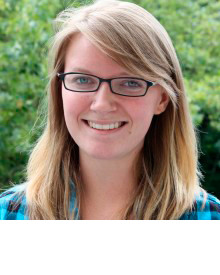 Karen Lickteig ’12 received two scholarships to support her study of international affairs.
Karen Lickteig ’12 received two scholarships to support her study of international affairs.
Karen Lickteig ’12
Hometown: Wichita, Kansas | Major: international affairs
How did you decide to focus your studies on the Middle East?
I knew coming to Lewis & Clark that I wanted to be an international affairs major. Growing up, I was in a somewhat isolated and inward-looking society, and I decided that I wanted instead to explore the vast world we live in.
In my first year here, I took a couple of classes focused on Middle Eastern culture and politics that stirred in me a strong interest in the region. In a sociology/anthropology course with Professor Oren Kosansky, we had many discussions about the values of cultural awareness and understanding, and the extent to which “outsiders” may be more accepted over time and with effort and sensitivity to culture. An international affairs course with Professor Cyrus Partovi furthered my recognition of the sheer importance of communication. The United States’ role in the Palestinian/Israeli peace process, our relationship with Syria, the importance of Egypt and its leaders, the war in Iraq, and the developing Iranian issue are all topics in which mutual understanding is critical.
What interested you in applying for a scholarship from the Clinton Presidential Foundation, and what are you looking forward to about studying in Dubai this fall?
When I was searching last year for summer language institutes, I ran across the website of the American University in Dubai, and a page about the Clinton Scholars Program. The program sounded too good to be true: an opportunity to study on full scholarship in Dubai, UAE. I of course had read about Dubai in history books and news articles—the sky-high construction plans (and the debt to prove it), the confluence of world cultures, and the crossroads of global commerce. I knew that going to the American University in Dubai as a Clinton Scholar would give me the chance to study the Middle East from the heart of it and expose me to an unforgettable cultural experience.
I am looking forward to continuing to study Arabic, as well as taking a full load of classes that center on the Middle East. Lewis & Clark has given me a great foundation to begin with in terms of history, politics religion, and culture, and I am ready to dive even further into the complexities of the region. I am also looking forward to being somewhere completely different from where I am now: I have never left this continent before, and the possibilities that Dubai holds for new experiences are endless. I also know that Dubai is far from perfect, and the trip won’t be an easy one—Dubai is far from the untainted paradise that we see in pictures. I hope to really engage with my surroundings, digging deeper than tourist attractions and orientalized images to see what lies under the surface.
This spring, you also received a scholarship from the Oregon Consular Corps. What will that scholarship support? What do you see as the value of diplomacy in our contemporary world?
It was a great honor to be one of the first two students to receive the OCC scholarship. I know that the applicant pool was full of some of my most outstanding peers in the department, and I was very grateful to have been chosen from them. The scholarship, while helping to support my tuition costs, also put me in contact with the distinguished members of the Oregon Consular Corps. Oregon has a sizable list of Consulates who represent many countries, mostly in Europe and Southeast Asia. Meeting some of these representatives has been truly rewarding, and I appreciate the work that they do to ensure harmony between Oregon and other countries. The value of their work and diplomacy more generally should not be underestimated. Communicating day to day with our closest friends is often a challenge; the most daunting task of all is communicating effectively with those who have different cultures, goals, and languages than us.
More Newsroom Stories
Public Relations is located in McAfee on the Undergraduate Campus.
MSC: 19
email public@lclark.edu
voice 503-768-7970
Public Relations
Lewis & Clark
615 S. Palatine Hill Road MSC 19
Portland OR 97219
